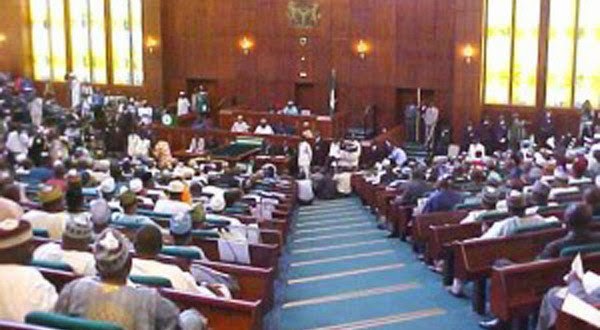Security and Situational Awareness, Open Source Intelligence, Cybersafety and Cybersecurity, Threat Alerts, Geopolitical Risks, etc. Vanguard Of A Countering Violent Extremism Advocacy: "Nigerians Unite Against Insecurity, Terrorism and Insurgency". For Articles, Press Releases, Adverts etc, Email: donnuait(a)yahoo.com, Twitter: @DonOkereke.
Wednesday, 22 October 2014
Thursday, 16 October 2014
Constitution Amendment: House of Representatives Removes Immunity For President, Governors, Approve "Independent Candidacy"
The final process in the amendment of the constitution started in the House of Representatives yesterday.
The House approved 71 amendments to the Constitution after an executive session.
The mandatory two-thirds required (240 of the 360-member House) for the amendment to pass was met as 252 of the 261 members that voted were in favour of the amendments. Eight voted against and one abstained.
The lawmakers have placed the National Security Agencies, the office of the Auditor-General of the Federation, the Police, Revenue Mobilisation Allocation and Fiscal Commission, on a first-line charge from Nigeria’s Consolidated Revenue Account.
The President or Deputy President of Senate and Speaker or Deputy Speaker of the House of Representatives are to receive pension for life as approved by the lawmakers.
The President will mandatorily address a joint meeting of the National Assembly once a year, if the amendments get the Senate’s concurrence and are approved by two thirds of the 36 state Houses of
Assembly.
But the review suffered a setback in the Senate.
Though the consideration of the report of the conference committee on the review of the Constitution of the Federal Republic of Nigeria, 1999 (further amendment) Bill 2014 was listed in the Order Paper, the consideration could not hold due to lack of quorum.
The Senate Committee on Rules and Business listed in the Order Paper: “That the Senate do consider and approve the report of the Conference Committee on the Review of the Constitution of the Federal Republic of Nigeria 1999 (Further Amendment) Bill, 2014.”
It was listed against the name of the Deputy Senate President Ike Ekweremadu, who is also chairman,
Senate Committee on Review of the 1999 Constitution.
It was gathered that the Senate leadership decided that because the required quorum for the consideration of the report of the conference committee was not formed, the consideration of the report would be taken on another legislative day.
Our correspondents also gathered that the Senate leadership did not want to play into the hands of those who might accuse it of sidelining some senators in the consideration of the report.
It was not clear if the report would be considered today.
While considering the 108-page report, the House approved “independent candidacy” to participate in general elections as well “life pension for President, Vice President, Senate President, Deputy Senate President, as well as Speaker and deputy Speaker of the House of Representatives”.
This is contingent on if the occupant was not impeached from office.
Members also approved Section 7(1a) which prohibits appointment of caretaker committee by governors while 7(1b) provides for four-year term to democratically elected council. Subsection 7(1c) grant financial autonomy to local governments.
They approved the immunity clause, Section 4(7a), which states that “in the course of exercising the foregoing legislative powers, no civil or criminal
proceedings shall be instituted against a member of a legislative House in respect of words spoken or written before the House or a committee thereof.”
These were part of the recommendations of the harmonised report of the Ad-hoc Committee on
Constitution review adopted by the lawmakers at the Committee of the Whole.
Other amendments approved include state creation, indigeneship and citizenship, budgetary process and role for traditional Rulers, among others.
An alteration of Section 241, which inserts a new subsection (2A), bars Nigerian courts or tribunals from
staying any proceeding on account of an interlocutory appeal.
They also voted to include in the concurrent legislative list seven items which include railways, agriculture and pensions.
Federal lawmakers also backed adoption of referendum for state creation.
They, however, rejected the amendment of Section 9 to allow for a referendum in determining the fate of the National Conference recommendations.
An alteration of Section 7, among others, stops revenue allocation from the federation account to local governments that are not democratically elected.
Local government administrations also stand dissolved at the expiration of four years, commencing from the date the members of Council were sworn in.
An alteration of Section 59 allows the National Assembly to bypass the president should he fail to sign
a Bill presented to him within 30 days.
It states: “Within seven days, the President of the Senate shall convene a joint sitting of the National Assembly to reconsider the Bill and if passed by two-thirds majority of members of both houses at such joint sitting, the Bill shall become law and the assent of the President shall not be required,” the alteration reads.
The action is the most far-reaching amendment made to the constitution.
It was learnt that the closed- door session was to allow members agree on the modalities for the voting on the
amendments.
The leadership was said to have impressed it on members that there was need to pass the amendments without bickering due to its importance to democracy and the need to conclude it expeditiously.
The report will be transmitted to the 36 Houses of Assembly for concurrence, after the Senate’s concurrence.
Chairman, Ad-Committee on Constitution Review, Emeka Ihedioha, said exhaustive deliberations with the Senate on the areas of differences was done with due regard to the wishes of the people,
“At this stage, we also urge you to reach out to your respective House of Assembly members whom Section 9
of the Constitution have made critical and distinctive partners, to support the realisation of the recommendations of the Committee here attached, which we believe is another milestone towards
repositioning our fundamental legal framework for public good,” he said.
Source:
The Nation

